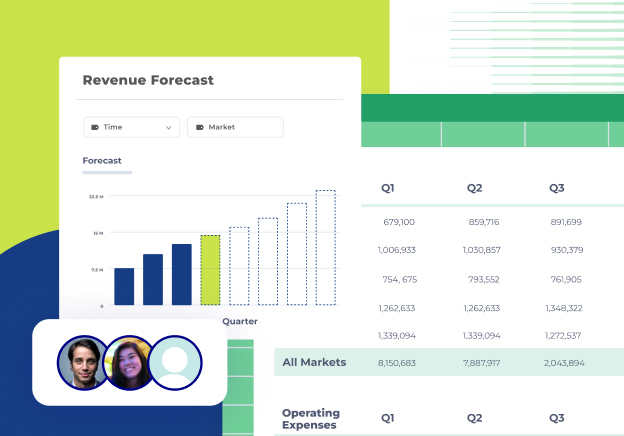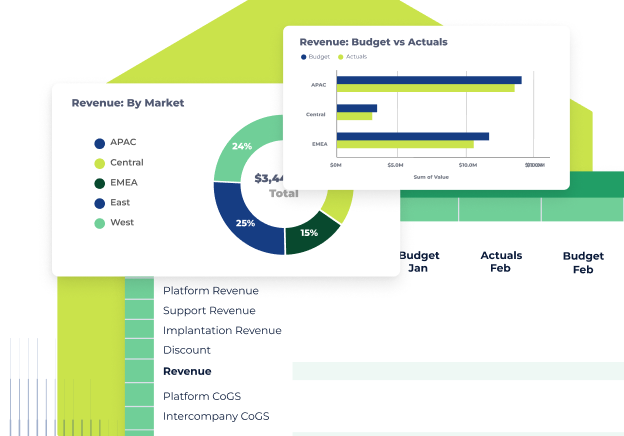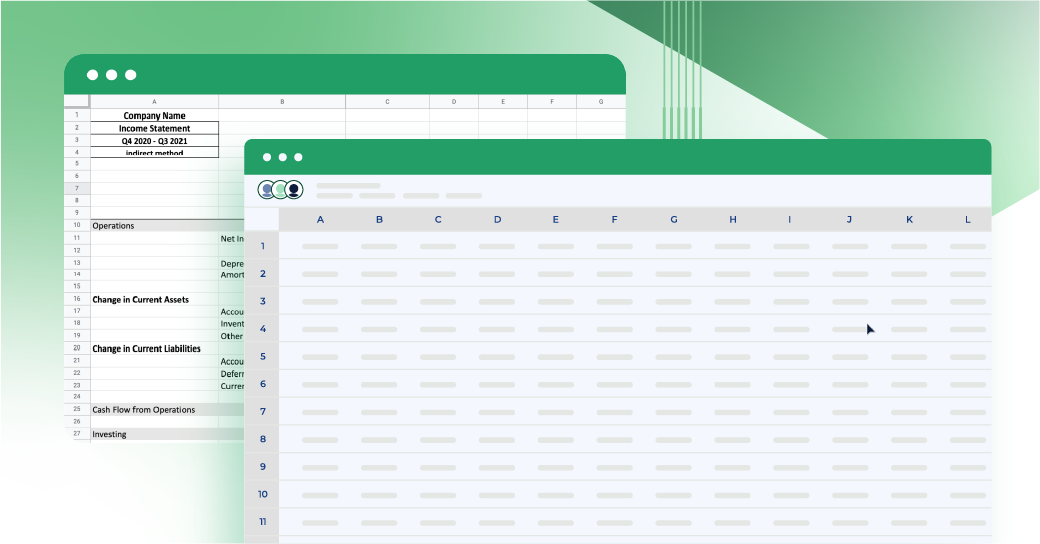What is financial planning and analysis (FP&A)?
Financial planning and analysis (FP&A) is the set of financial practices encompassing planning, forecasting, budgeting, and analysis. FP&A supports a company's principal business decisions and financial performance.
While finance is responsible for record-keeping, accounting, payroll, compliance and control, risk management, and investor relations, FP&A focuses explicitly on the future financial standing of the company.
From routine activities—like financial close and consolidation, cash flow reporting, and financial reporting—to strategic initiatives—including financial insights on planning, budgeting, scenario planning, financial forecasting, and (ad hoc) financial modeling—FP&A covers a lot of ground.
What is a financial planning analyst?
The FP&A team has one of the most mission-critical positions in any organization.
Financial planning professionals must understand both accounting and business operations. They're responsible for ensuring upper management's strategic plan is grounded in reality and reflects the current conditions that exist for the company financially.
While there are many roles within an FP&A team—FP&A Manager, FP&A Director, CFO—the analyst focuses solely on gathering company-wide data to determine the financial health and future of the organization.
In an FP&A job description, the role of a financial planning analyst is outlined as key to managing and shaping an organization's financial strategy. These professionals must have a firm grasp of both accounting principles and business operations.
FP&A professionals report directly to the CFO and the organization's CEO, sharing financial reports and models to review and use to make financial decisions. The real value of the FP&A team comes when they provide insights for executives and the broader company.
FP&A job description & career path
Let's review what skills an FP&A analyst needs and then look at a sample job description.
What is an FP&A job?
Any job that works to collect and analyze data for financial planning, forecasting, budgeting, and modeling is considered an FP&A job.
The exact job titles and specific roles for each position can vary from company to company.
The typical starting role on an FP&A team is the FP&A analyst. However, most employers want a few years of experience in accounting, finance, or business development before hiring an FP&A analyst.
Roles and duties of FP&A professionals
The roles and duties of FP&A professionals can vary from one organization to another, but tasks often include:
- Collecting and recording historical data
- Managing databases of financial records
- Creating financial analysis reports and models
- Collecting financial data from internal departments and external sources
- Setting and tracking key performance indicators (KPIs) and objectives
- Collaborating directly with the accounting and finance departments
- Using planning methods like predictive planning, driver-based planning, and multi-scenario planning to create financial forecasts
- Budgeting the expenses needed to execute the corporate plan
Luckily, FP&A software has enabled FP&A analysts to automate all the manual, error-prone work to focus on the analysis and forecasting that bring tangible results to their companies.
These solutions are the source system, the database, and the FP&A tool.
The source system is where the raw data lives. These might include:
- Accounting/ERPs (Sage Intacct, NetSuite, QuickBooks, Xero, PeopleSoft, etc.)
- Human Resources/Payroll (ADP, ChartHop, Greenhouse, Lever, Justworks, etc.)
- Billing & Operations (Chargebee, Zuora, Ordway, etc.)
- Sales & Marketing CRMs (Salesforce, HubSpot, etc.)
- Business intelligence tool(s) (MongoDB, Power BI, Tableau, Microsoft Azure, etc.)
Then there's the database, which organizes and ensures all this data is hygienic. Sometimes the database isn't a discrete tool. Some tools have extra functionality on top of being a database.
Cube is one of these tools. Cube offers a wide range of features to aid and enhance FP&A. One of the most notable features is the ability to natively integrate with any spreadsheet like Google Sheets and Microsoft Excel.
In FP&A jobs, analysts can streamline manual data, reduce errors, and drill down to make smarter business decisions in a fraction of the time.
FP&A job titles
- FP&A Analyst: They gather data about a corporation's finances, develop financial models, and create in-depth summaries. They build extensive databases to contain and sort information about a company's income, expenses, and funding options. The FP&A analyst will typically perform ad hoc analysis
- Senior FP&A Analyst: They oversee junior analysts' projects, provide analysis for the data they collect, coordinate with other departments, and present reports to managers. Senior analysts contribute to implementing corporate operations plans to meet budgeting goals and projections and conduct research and analytics for special projects like logistics optimization and acquisitions.
- FP&A Manager: Managers perform quality control tasks to ensure that all analysts produce accurate variance analysis and rolling projections. They run meetings with corporate department heads to help them determine major expenses based on analyst reports and they're responsible for combining finance reports from multiple departments to develop a vision for the company as a whole. They're also active in the hiring process and train analysts to build their financial insight and business acumen.
- FP&A Director/Vice President: It takes years of experience in financial planning and management to reach the director role. The director or vice president of FP&A develops complex strategic plans for how a corporation manages its finances and works closely with senior management, company executives, and shareholders. FP&A directors present the risks and rewards of various financial planning methods and recommend how a company leadership should spend, save and invest to meet their specific goals.
- Chief Financial Officer: They head a company's financial operations, including planning and analysis. While other FP&A roles consult on financial issues and advise, CFOs ultimately decide major financial planning subjects. They're responsible for developing monetary policies and reporting procedures that comply with industry regulations.
Financial planning analyst education, certifications, and experience
The first step for those seeking a career in FP&A is getting the proper education, certifications, and experience to help them land the job.
You need at least a bachelor's degree in a finance-related field for education. Acceptable majors include:
- Finance
- Accounting
- Business
- Economics
- Statistics
If you are interested in going the graduate school route, consider the following degrees:
- Master's in Business Administration
- Master's in Financial Planning
- Master's in Finance
- Master's in Financial Analysis
- Master's in Accounting
In the context of FP&A jobs, possessing certain certifications can provide a significant competitive advantage, particularly for those who may not hold a master's or other graduate degrees.
- Certified Financial Analyst (CFA)
- Series 7
- Series 63
- Securities Industry Essentials (SIE)
- Certified Public Accountant (CPA)
To get your foot in the door for an FP&A analyst role, companies typically like to see that you have a few years of experience in a financial role first.
FP&A salary
The salary of any FP&A position will vary depending on the size and location of the company you work for.
However, the average starting salary for an FP&A analyst is around $50k annually, with median salaries around $80k annually.
As you climb the ladder over the years, the salary will increase; average senior-level FP&A analysts, managers, and directors' salaries start at around $100K.
You can expect to break six figures even more quickly in more expensive cities like New York, London, or San Francisco.
When you hit the level of CFO, you are looking at salaries starting well into the six-figure range, and some even hit seven-figures. An FP&A career can be lucrative if you put in the time and effort to get there.

Sample FP&A job description
Let's look at a sample job description for a financial analyst.
Job Description
As an FP&A expert, you will report to the finance director with direct reports.
Your responsibilities will include providing financial insights and projections to the accounting team. You will provide reliable data and analysis for decision-making and planning.
You will prepare accurate monthly financial reports, identify action items, and effectively frame decisions that need to be made.
Responsibilities
- Provide FP&A finance support to the accounting teams regarding productivity, demand planning, reporting, and financial metrics
- Prepare budgets and forecasts, variance analyses, long-term planning, risk/opportunity assessments, and periodic/ad hoc reporting
- Work on corporate projects and initiatives that impact the entire organization
- Partner with the accounting team during the close process, which includes reviewing departmental general ledgers, recording transactional activity, preparing revenue and expense accruals, and providing P&L and Cash variance explanations to budget and forecasts
- Identify areas for revenue opportunities and cost improvements
- Serve as Finance liaison to departments by working closely with them in understanding their business, supporting their initiatives, and general financial inquiries
- Identify and research variances regarding forecast, budget, and prior-year expenses
- Assist in automating the consolidated reporting process
- Conduct necessary account and system reconciliations
- Review financial reports, presentations, and other management reporting needs
- Ad hoc business reporting and analysis as needed
- Additional responsibilities as assigned
Skills
- Bachelor’s Degree
- 3+ years of experience
- General knowledge of accounting/financial/operational principles
- Interpersonal and communication skills with the ability to interact with various management levels
- High level of commitment to quality work product and organizational ethics, integrity and compliance
- Comfortable navigating through gray areas without clear solutions
- Superior attention to detail and ability to successfully manage multiple competing priorities while maintaining a view of the big picture
- Strong Excel skills
- Detail-oriented with the ability to multi-task and meet deadlines with minimal supervision
- Self-starter with good time management skills when urgent deadlines need to be met
Key questions to consider when reviewing an FP&A job description
Do the roles and responsibilities match my skills? Assess whether your current skills and technical expertise align with the tasks and requirements outlined in the job description.
Do I meet the qualifications? Consider if your educational background and work experience meet the role's requirements and if you're willing to obtain any necessary qualifications or training.
What are my career aspirations? Evaluate if the role aligns with your long-term career goals in FP&A and offers opportunities for growth within the company.
Can I handle the reporting structure? Consider your comfort with the described reporting hierarchy, team structure, and how the management style aligns with your preferred working environment.
What technological skills are required? Review your experience with the mentioned software and your willingness to learn new technologies if required.
Career longevity in FP&A
FP&A stands out as a career path offering not just immediate opportunities but also long-term career sustainability and growth.
The Evergreen Nature of FP&A
FP&A's role is crucial in any business, focusing on financial stability and strategic growth. This fundamental alignment guarantees a consistent demand for FP&A professionals, making them indispensable regardless of economic shifts.
Evolving Roles with Experience
In FP&A, career growth is a continuous journey. Starting as analysts, professionals advance to senior roles with more complex tasks. Managerial positions, like FP&A Manager or Director, follow, offering chances to directly impact financial strategies and business decisions. Ultimately, experienced individuals may ascend to executive roles like CFO, overseeing their organization's comprehensive financial strategy.
Continuous Learning: A Key to Sustained Success
FP&A is constantly influenced by new regulations, shifting market conditions, and the emergence of technologies like AI and big data analytics. Keeping pace with these changes through ongoing education, obtaining professional certifications like CFA or CPA, and gaining practical experience are vital for staying relevant and advancing in an FP&A career.
The role of technology in FP&A
The FP&A landscape has been significantly reshaped by technology, requiring professionals in FP&A jobs to be proficient in financial fundamentals and adept in using advanced analytics tools and software.
Embracing Advanced Analytics: The use of AI, machine learning, and predictive modeling has revolutionized FP&A. These tools enable quicker, more accurate analysis of large data sets, essential for nuanced financial strategy development.
Enhanced Forecasting Accuracy: Advanced tools aid FP&A professionals in producing precise forecasts by leveraging historical data and predictive analytics, improving decision-making with insights into future trends.
Streamlining Operations: Technological advancements automate routine tasks like data collection and report generation, increasing efficiency and allowing FP&A professionals to focus on strategic analysis.
Driving Strategic Insights: Quick and thorough data analysis equips FP&A teams to offer deeper insights, swiftly identifying risks and opportunities, thus enhancing strategic business planning.
Reinforcing Strategic Role: Effective use of technology solidifies FP&A professionals' role as crucial strategic advisors, making their technology-backed insights vital for informed business decisions.

Where to find FP&A jobs
In the past 20 years, finance has started taking a more active role in many companies, and the COVID-19 pandemic compounded this.
The almost 15% unemployment in April 2020 was, among other things, an indication of how many companies weren't prepared for a sudden economic downturn.
This was when many companies woke up to the idea of FP&A as a strategic partner.
Christina Ross, Cube's Co-Founder and CEO, called this "the great re-planning."
Companies face an uphill battle without the ability to efficiently forecast and create annual budgets. FP&A not only helps companies make the plan, but it also helps them adjust the plan for better success.
FP&A roles are predictive, resilient, and mission-critical—so it's no wonder job positions are growing.
When you're ready to start your search, check out all of the job board websites and networks:
- LinkedIn
- Indeed
- Monster
- ZipRecruiter
- Glassdoor
It can also be worthwhile to connect with a recruiter that will be able to set you up with some interviews.
Every major corporation needs a strong FP&A team. And every growing company will have to build its FP&A team.
Conclusion: Is an FP&A career right for you?
FP&A careers can be hard work, but they're also very rewarding and lucrative as FP&A teams remain a central strategic force within organizations. The potential for growth in these teams will only rise.
FP&A software has also made a significant impact on the FP&A industry. FP&A software allows teams to do their work quickly, efficiently, and without error to better support the financial health of their business.
Cube is the first spreadsheet-native FP&A platform that empowers teams to drive better planning and performance without changing how they work. Our cloud-based FP&A software platform helps the corporate financial analyst quickly and confidently plan, generate quarterly financial reports, and analyze financial results.
Whether you are starting out as an FP&A analyst or the VP of FP&A at your company, Cube will make your job easier. Book a demo today.
Sources cited:


.png)








.png)


